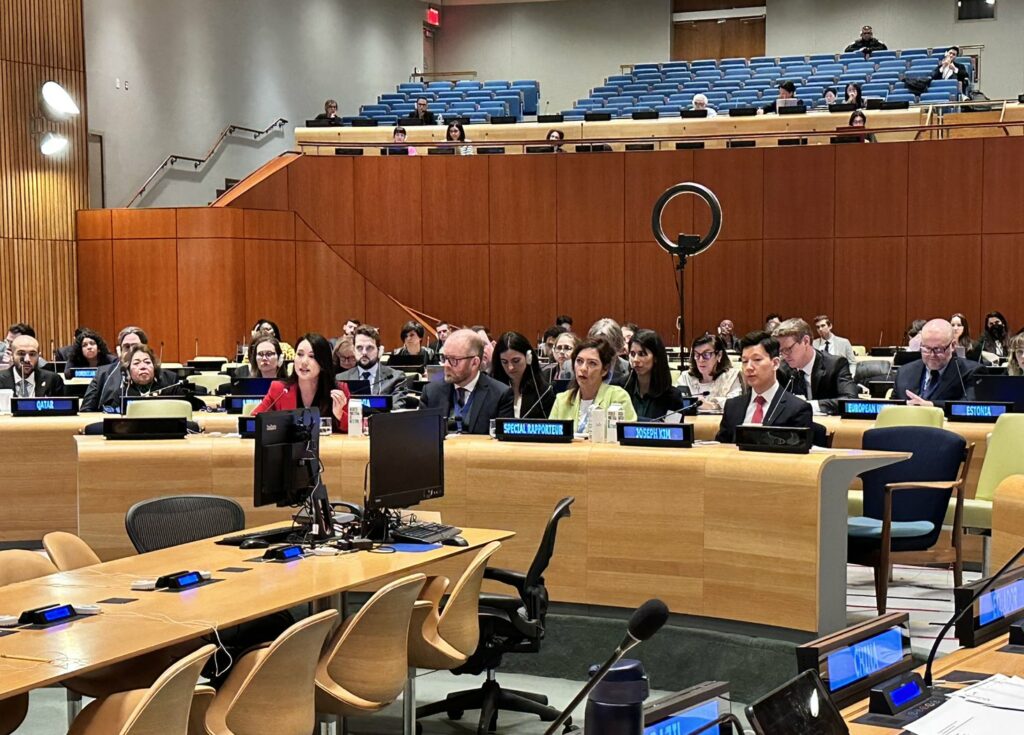Authoritarian regimes are bullying people in the heart of the United States, and we don’t recognize it.
Freedom House calls this practice “transnational repression,” which is when governments silence dissent outside their own borders.
As North Korean refugees living in the United States, we have been targets of transnational repression ourselves. Unfortunately, this experience is all too common for American citizens and refugees who have escaped tyranny in their homelands. We need to push back. That’s why the U.S. government, civil society, and freedom activists everywhere should use their platforms to increase awareness of this practice and help the United States become more resilient to it.
In March, we were invited to speak before an informal gathering of the United Nations Security Council in New York to highlight ongoing human rights abuses by the North Korean regime and call for more robust international efforts to promote peace and accountability for these violations.
Growing up in North Korea, we both witnessed and experienced the regime’s cruel human rights abuses and degradation of human dignity.
North Korean citizens are denied fundamental liberties, including freedom of speech, freedom of religion, and freedom of movement. If we dared express discontent with the state, up to three generations of our family would be sent to prison – sometimes for life – or even murdered.
At the Security Council meeting, we hoped to share our personal experiences with policymakers and highlight connections between human rights and security challenges in North Korea – including Pyongyang’s export of many of its citizens as forced labor to fund its nuclear weapons program.
A Chinese representative present at the meeting argued that the primary function of the Security Council is to advance security and peace, not human rights, and used China’s veto power to cut off the planned livestream of the event, preventing a wider audience from hearing our testimonies.

An authoritarian power robbed us of our freedoms in the middle of the U.N. This is especially egregious because the right to free expression, including “freedom to hold opinions without interference and to seek, receive, and impart information and ideas through any media and regardless of frontiers,” is guaranteed in the U.N. Declaration of Human Rights. This is unacceptable.
Our experience isn’t an isolated incident.
Masih Alinejad is an Iranian freedom activist who was forced to flee her country. She’s also an American citizen who lives in Brooklyn. Recently, the United States charged three men with ties to the Iranian government in a plot to kill Alinejad. One of them was arrested while driving around her home with a loaded rifle and a stockpile of ammunition.
Authoritarian regimes are getting bolder and even working together to repress freedom well beyond their own borders. A recent George W. Bush Institute report details how the North Korean government allies with other authoritarian regimes like China to do just that. Beijing hunts down and forcibly repatriates North Korean escapees – a direct violation of international law – where they face a wide range of inhumane punishments.
The regime continues to inflict psychological harm on North Korean escapees living in the United States who want to advocate for freedom in their home country. Pyongyang threatens the families of escapees still living in the Hermit Kingdom, and many North Koreans living in the West are forced to remain silent and live anonymously to keep their families safe.
The Biden Administration, Congress, and state governments should provide platforms to advocates to educate Americans on transnational repression and help increase understanding of how this practice targets American citizens and vulnerable refugees.
Using existing tools that punish the human rights abuses of foreign governments – like the Global Magnitsky Act, the Countering America’s Adversaries Through Sanctions Act, or the Khashoggi Ban – the administration and Congress should bolster efforts to penalize foreign officials who are linked to acts of transnational repression. And this shouldn’t preclude Washington from developing new efforts and legislation aimed at raising the costs for authoritarian governments using this tactic.
Those being targeted by autocrats also have an important role to play. These individuals must build resilience by informing themselves and learning their rights to positively contribute to society. This is one of the reasons the Bush Institute has invested in young North Korean escapees through the Lindsay Lloyd North Korea Freedom Scholarship and leadership training.
We have both experienced how dictators rob their people of dignity and freedom. We are outraged that they’re trying to do it here in America. If they can get away with it here, they can do it anywhere. Stop them before it’s too late.
Seohyun Lee is a graduate student at Columbia University’s School of International and Public Affairs and a North Korean human rights advocate. Joseph Kim is Program Manager of Global Policy at the George W. Bush Institute.






























